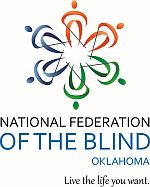The National Federation of the Blind of Oklahoma with support from the Oklahoma Rehabilitation Council and the Oklahoma Rehabilitation Association issued the below letter in opposition to HB 1861 currently pending in the Oklahoma House of Representatives. This bill will go before the House Committee on Appropriations and Budget on Wednesday, March 1. We encourage all our members, family and friends to contact your Representative and tell them that this measure will limit services to the older blind of Oklahoma and that you oppose the bill. If you do not know who your representative is, you can search by visiting the Oklahoma Legislature Website.
The National Federation of the Blind of Oklahoma will be meeting at the Capitol on Wednesday to oppose this legislation as well as HB 2230 which seeks to exempt county jails from the Blind Entrepreneurs Program thus putting blind Oklahomans out of work. We need you there! For more details about our activities at the Capitol, please read this post. Help the blind of Oklahoma push back and show the Oklahoma Legislature that they can’t make policy about us, without us.
February 26, 2017
Dear Members of the House Committee on Appropriations and Budget:
The National Federation of the Blind of Oklahoma, Oklahoma Rehabilitation Association, and the Oklahoma State Rehabilitation Council were shocked and dismayed by the introduction of HB 1861, a bill establishing the “Rehabilitation Services Disbursing Fund.” This bill would diminish services to older blind Oklahomans due to geographic limitations for services, limit capacity, and expose the state to undue financial risk.
Currently, the Oklahoma Department of Rehabilitation Services Division of Visual Services assigns experts; many of them blind themselves, to work with clients in their home anywhere in the state. The current approach has many advantages that may be compromised if the program is entirely implemented by a private contractor. In contrast, HB 1861, upon which the House Committee on Appropriations and Budget will vote in the near future, proposes that funds for the older blind program be entirely granted to private entities certified by the National Accreditation Council for Blind and Low Vision Services (NAC). While a network of regional service providers is possible, this is an unproven service model and will certainly result in diminished services during the transition period. Moving this work to private entities with only regional services will result in diminished services for clients outside their service area, especially in rural parts of the state.
It will be a time consuming and costly process for another entity to replicate the breadth and depth of services offered by Visual Services. For example, Visual Services already has access technology, Braille, orientation and mobility, and customized independent living classes. These customized classes are based on years and years of experience working with older blind Oklahomans.
Rehabilitation services are overseen at the federal level by the Rehabilitation Services Administration (RSA). The RSA is charged with ensuring that state rehabilitation plans are submitted yearly, monitoring their implementation, and disbursing federal funds to state rehabilitation agencies to carry out these plans. If the RSA determines that a rehabilitation plan has not been properly implemented, it can assess substantial financial penalties against the state rehabilitation department in order to recoup the federal funds received to implement the plan. It is important to note that such assessments would be levied against the state of Oklahoma, not against the private entities. In other words, if a private entity fails to provide adequate services to older blind Oklahomans, tax payers will be left on the hook.
In summary, this bill will have the unintended consequences of diminishing services for older blind Oklahomans, limiting consumer choice, and exposing the state to uncertain financial penalties for services not directly performed by the state. Furthermore, years of sad experience tell us that NAC-accredited entities do not meet the needs of blind people because NAC’S expectations and standards are very low. We therefore oppose this bill and urge the committee to vote against it.
Sincerely,
Jeannie Massay, President
National Federation of the Blind of Oklahoma
